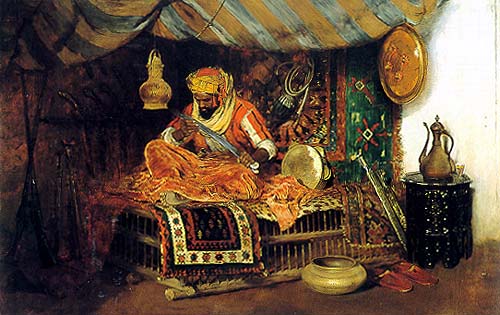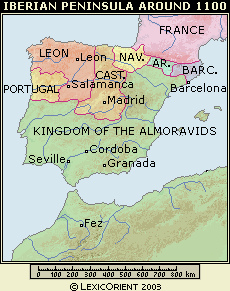Who were they?
The Moors are not a specific race of people. The word has never been clearly defined and remains ambiguous and confusing. This term has been broadly used to denote various people in North Africa, people who came from Morocco or simply to describe Muslims in general. Christians in the 13th century also referred to the Moors as "Moriscos" and "Mudejares".
The word MOORS may have evolved from the Greek 'Mauros' which means 'dark'. The Greeks were in Spain around 500 BC, 300 years before the Romans. The Romans probably pinched it from the Greeks, complete with its original connotation of 'dark'.
This might explain why the Latin 'Maurus' translates literally into 'Moors', with no further definition. Borrowing directly from the Greek meaning, this would have been good enough for the Romans to describe the 'dark' skinned people of North Africa. This is all conjecture of course, but its close enough for me.
In any case, the word was first applied officially to the indigenous people of a Roman province in North Africa called Mauretania (Latin =
'land of the Moors'). This roughly corresponds to present day North Morocco and Algeria. The name Morocco is another reminder of the region's
"Moorish" past.

The Moorish Warrior - William Merritt Chase (1878)
|
"Circa 46 B. C., the Roman army entered West Africa where they encountered black Africans whom they called 'Maures' from the Greek adjective mauros, meaning dark or black." Chandler, Wayne B. "The Moor: Light of Europe's Dark Age."
The Webster's New World Dictionary identifies Moors as "a member of Moslem people of
mixed Arab and Berber descent." This deletion of "black" or "Negro" from the term Moor is generally recent. Though the
word "Moor" originally seems to have been meant to indicate Blacks, it in time came to be applied to Muslims in general,
especially the Berbers. |
When the Arabs swept westward and captured North Africa in the 7th century, the term was revived by Europeans to denote not only the indigenous Negroes and fairer skinned Berbers of North Africa, but the Arabs as well. Following the Arab conquest of the Berbers, inter-marriages were common and the two races (Berber and Arab) gradually merged together. Did the Berbers and Arabs do the inter-marriage thing with the dark skinned Negroes also? Probably. Who knows what went on behind closed doors. I wasn't there.
 Berber identity currently is linked to the language: many of the North Africans
calling themselves Arabs are more Berber in origin than Arab. In many areas (especially Tunisia), Berber identity is
regarded as a negative, principally because many Berber societies are less developed than those in urban settings, where
almost all inhabitants see themselves as Arabs. In Algeria, Berber identity is strong and proud, and there are centuies-old
tensions between the Berbers of the mountains and the Arabs of the larger cities. Berber identity currently is linked to the language: many of the North Africans
calling themselves Arabs are more Berber in origin than Arab. In many areas (especially Tunisia), Berber identity is
regarded as a negative, principally because many Berber societies are less developed than those in urban settings, where
almost all inhabitants see themselves as Arabs. In Algeria, Berber identity is strong and proud, and there are centuies-old
tensions between the Berbers of the mountains and the Arabs of the larger cities.Encyclopaedia of the Orient. |
With regards to Spain, the term 'Moors' later became a convenient blanket term, to describe the collective Muslim conquerors and rulers in
Andalucia between 711 and 1492. This is far too general for my liking. To gain a more accurate perspective into the origins of flamenco, we
should try to isolate the main racial elements during the 800 years of Muslim occupation in Spain.
|
(I hope all this isn't putting you to sleep. There are some juicy bits coming up real soon, so stay with me if you like
heroic tales of intrigue, betrayal and bloodshed.)
|




